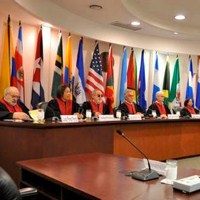Last Friday, as the extraordinary session of the Organization of American States (OAS) General Assembly stretched well into the night, Venezuelan Ambassador to the OAS Roy Chaderton announced that the balance of power in the hemisphere had shifted. “We’re in rebellion against this corrupt and pusillanimous system,” he said, referring to the Inter-American human rights system, whose fate was -- and remains -- under discussion. “Spring,” Chaderton declared, “is coming to the OAS.”
The rebellion Chaderton referred to has been underway for some time, with Venezuela, Ecuador, Nicaragua and Bolivia pushing for reforms to a human rights system that they argue is politically biased in the service of U.S. interests. Friday’s extraordinary session was expected to mark the culmination of two years of discussion by OAS members about how to reform the Inter-American system, and more specifically, its two main bodies: the Inter-American Commission on Human Rights and the Inter-American Court of Human Rights, both of which have been responsible for protecting human rights in the hemisphere for decades. Far from “pusillanimous,” the commission has investigated thousands of human rights petitions and promoted conventions on some of the most important issues in the hemisphere, including torture and forced disappearances; economic, social and cultural rights; and violence against women.
The Inter-American Commission’s main detractors are some of the countries whose human rights records have drawn the most scrutiny from the commission in recent years. In Chapter 4 of its annual report, the commission identifies “member states whose human rights practices merit special attention.” Venezuela has received such “special attention” in the commission’s annual reports for most of the past decade. In September 2012, Venezuela renounced the American Convention on Human Rights, one of the founding pillars of the commission, meaning that complaints against Caracas can no longer be brought before the Inter-American Court after September 2013.

